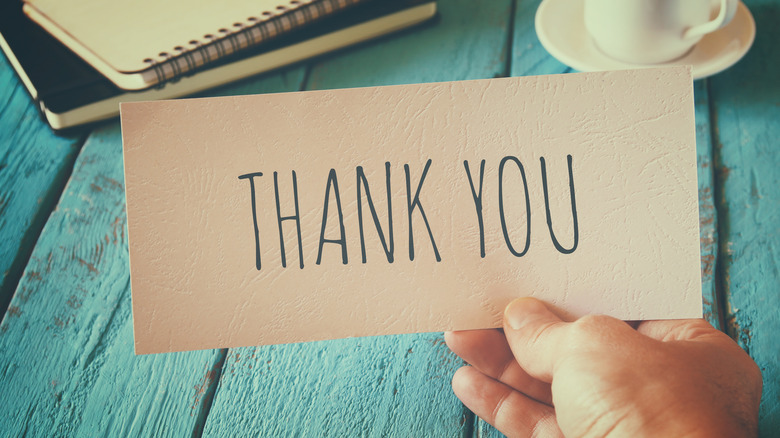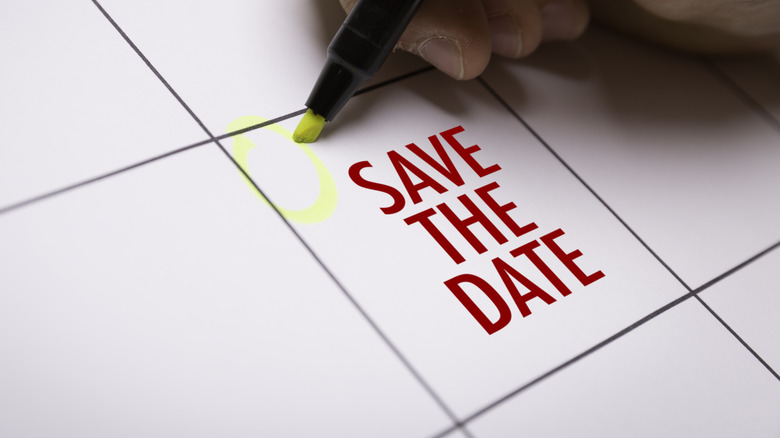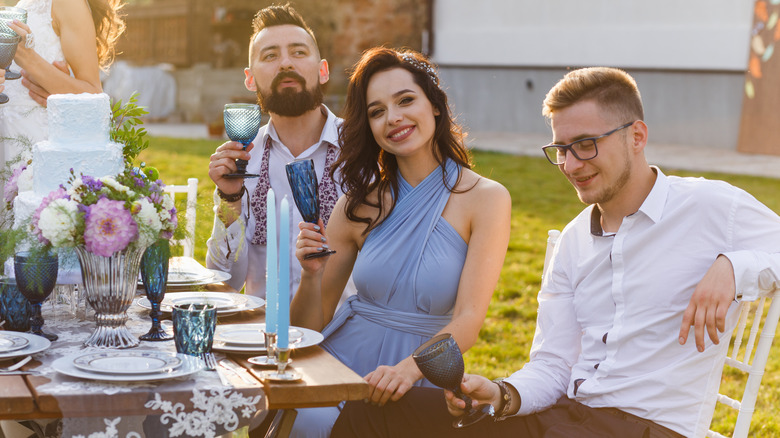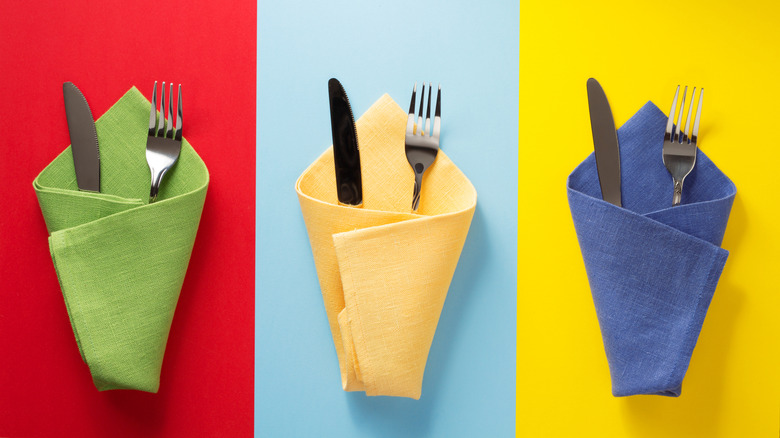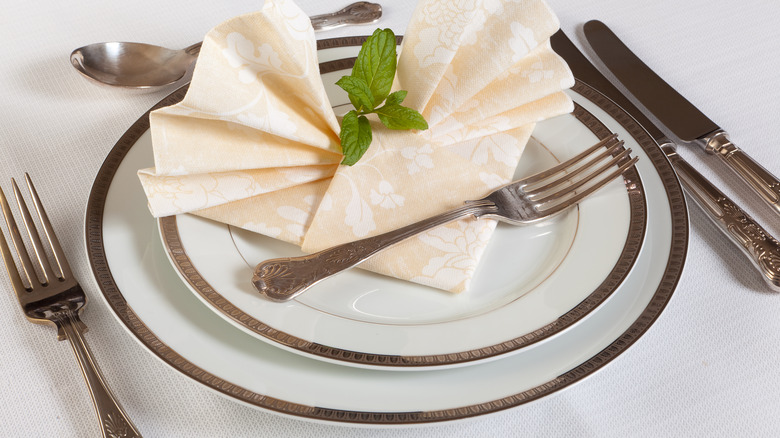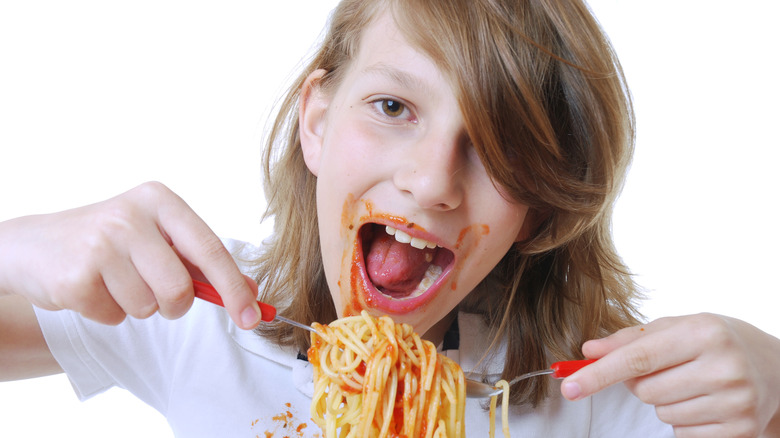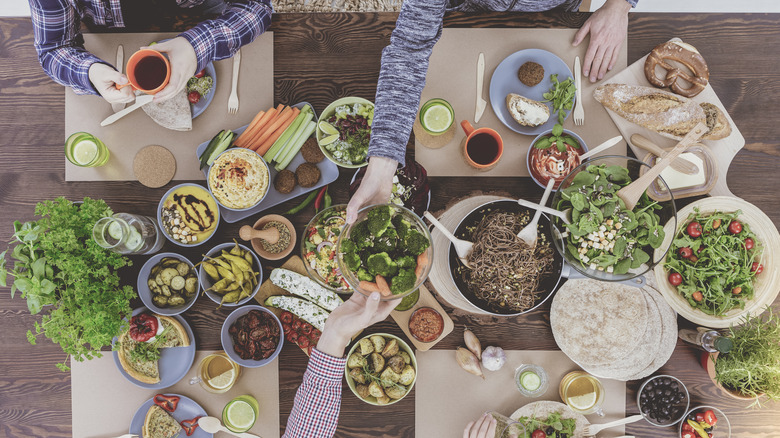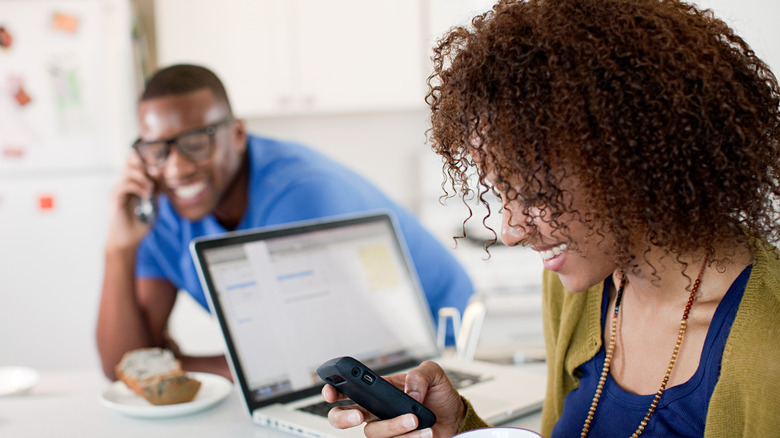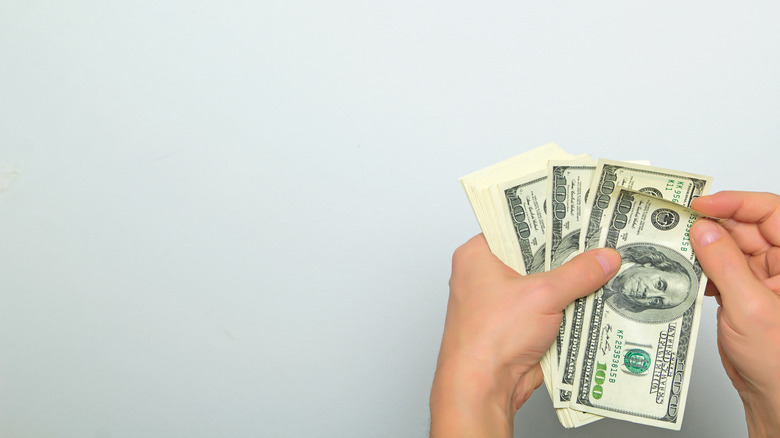Etiquette Mistakes You Never Knew You Were Making
We've all been guilty of picking up the wrong fork, cutting in line, and perhaps we've even interrupted someone speaking. But most of us know the difference between being respectful and rude, right? Maybe we just think we do. I spoke with top etiquette experts to figure out how we can recognize etiquette mistakes we might not even realize we're making in a variety of social situations, as well as how to correct them.
You're not sending thank you notes
As children, one of the first things we learn about etiquette is to say "please" and "thank you." But according to Jodi RR Smith of Mannersmith Etiquette Consulting, a verbal thank you simply is not enough. You also need to send a note.
Etiquette expert Lisa Grotts added, "Planning and giving parties is a lot of work. Don't forget to say thank you when you leave an event, then call the next day and send a thank-you note within 24 hours so the message is not lost."
Perhaps so many of us are hesitant to send thank you notes because we don't know how to write them properly or aren't sure of the proper way to express our feelings of thankfulness. Sarah E. Kidder of Sarah Kidder Designs is an event planner and expert on event etiquette. She revealed to me that, "One of the typical etiquette challenges is not making a thank you note all about the writer. Sincere thank you notes do not have a lot of 'I' included."
Then there's the note itself. According to Devoreaux Walton of The Poise Pursuit, a proper thank you takes a pen. "A hand-written thank you note is more formal and often, more appreciated, than an emailed note."
Your sympathy cards are less than sympathetic
One of the most uncomfortable tasks that so many us are unfortunately faced with is writing a card to express condolences. Kidder says it is best to approach this by the same way you would with a thank you card — by taking yourself out of it, focusing on the person you are writing to and perhaps putting yourself in their shoes. "As a personal example, when my mother passed away, some well meaning notes and letters focused on how shocked the writer was, how sad, etc. They were long notes, all about the writer. Those were hard to read at that time, especially as a grieving young adult in shock."
Kidder also believes the most wise approach is to hold off with the uber-positivity in the early days and weeks while the grief is still fresh. "Stories of good times past often go over better after enough time has passed for those grieving to hear and enjoy the mutual affection for the departed."
You procrastinate your duties as a guest
If you are going to a meal or event at someone's home, you need to plan ahead of time or risk being rude. It's nice to be invited somewhere, whether it is out to dinner or to a party, but there is no more egregious way to reciprocate than to be an impolite guest. Smith told me that one mistake so many of us make isn't at the event itself, but when it comes to the invitation. She believes it is rude to wait until the last minute to RSVP.
Smith also shared, "Guests should never come to someone's home for a meal or visit empty handed." This means making sure to plan to leave the house early to have time to stop along the way and pick up a bottle wine, a sweet treat or even flowers. Or better yet, have something sent in advance.
You choose the wrong seat
It is important to be polite to the people you dine with, especially if you were the one who invited them out for a meal. When it comes time to sit down, the proper thing to do is to give them the best seat in the house. Walton explained to me: "If you are dining with an invited guest, such as a work client or acquaintance, and you invited them to dine with you, proper etiquette is to allow your guest to sit in the seat at the table facing the door at the front. This seat is generally more desirable, because the view of the front of the restaurant is better than the back."
You don't know what to do with your napkin
One of the biggest questions many people have when they sit down is where to put their napkin, according to Walton. "When dining at a restaurant, people typically tend to leave the silverware wrapped up in a napkin on the table, however proper etiquette is to put the forks and knives on a bread/appetizer plate, if you have one, and put your napkin on your lap upon sitting down at the table."
Grotts explained that until you are finished eating, you need to keep your napkin down. "The napkin stays on your lap through the meal or is placed on the chair if you must excuse yourself. Do leave your napkin on your chair if you leave the table in between courses so no one will see the stains. The napkin is placed loosely to the left of the plate at the end of the meal."
You are holding utensils incorrectly
According to Snezana Pejic, who is an etiquette coach and founder of The Etiquette Academy of New England, the dinner table is ripe with opportunities for social faux pas, especially when it comes to our eating utensils. She explained, "When using utensils, make sure you are holding them properly. Fork and knife are held with handles inside the palm to start with, and then eat depending on whether you are using them Continental or American style. The soup spoon should always be held like a pencil." Grotts added that you should scoop your soup spoon away from you, not towards you.
Your toasting is a little cold
Toasting a success or a fun occasion such as a birthday is a tradition in many cultures. After all, who doesn't love a good excuse to drink? But even a fun toast is a prime opportunity to make an etiquette faux pas, explained Grotts. "Never toast yourself at a gathering. This is the host's job. You can say thanks after you've been toasted." So keep quiet about your pride. At least for a few minutes.
It also turns out that timing is everything, according to Adeodata Czink of The Business of Manners. She told me that until the host makes a toast, you should not even put so much as a finger on your wine glass.
You aren't conscientious about what and when you eat
When it comes to food, there are many opportunities to be rude, especially because so many of us have specific dietary needs these days. Grotts says this can cause a major conflict of etiquette. "If you're a dinner guest, eat what is served unless you're allergic to that food. If you don't care for something, pretend to eat by mixing the food on your plate. If the host asks why you're not eating, just say that you're leaving room for dessert." Overall, when it comes to eating, Grotts' approach is to think small: "Do take small portions when serving yourself. You can always have seconds. [And] take small bites when eating."
When it comes to the main course, Grotts suggests keeping an open mind. "Do try a little bit of everything to be polite unless you have food allergies, but never be shy about letting your host know if you're allergic to something." She also shared another tip on how not to offend the chef and likely have a tastier meal, "Don't use salt or pepper until you first take a bite of food. It may already have the perfect amount of seasoning."
But the right dining etiquette isn't limited to what you eat, but also when you eat it. "Do wait until everyone is seated and served to begin eating or until your host gives the okay."
You're not sitting or acting properly at the table
Having a meal at someone's home isn't just about showing up and sitting down however you like. Grotts noted how you physically sit at the table is a reflection of your respect. "Remember your posture at the table. Straight versus slumped, please!"
And don't forget one of the worst mistakes that too many people make today. Grotts said, "Don't place items on the table that are not part of the meal, such as keys, purses, and cell phones."
Grotts also made another important point that applies to so many of us today. "Do keep dinner conversation pleasant. Avoid topics that might make anyone feel uncomfortable." So perhaps it's best to keep politics and religious debates away from the dinner table — save it for the cocktails or couch after dessert.
You asked someone out improperly
Dating, whether you meet in real life or online, can create many potential etiquette snafus. According to Pejic, sometimes those mistakes happen even before you go out on the date itself. She told me, "When asking someone on a date, the worst thing you can do is ask them through text. Ideally you should ask them in person. If that is not possible, ask them over the phone. You can text them to see when they have time to talk."
But sometimes the only way to ask someone out is through text, so if you are going to break that rule, be sure to do it in the most polite way possible. Pejic suggests, "If you absolutely must ask them through text, make sure it is a sincere and well thought out. For example, 'I hope you are having a good day so far. I got your phone number from your friend Susie. I would like to get together when you have time.' This way, you are allowing the person to either say 'I would love to (YES)' or 'I would love to but I am so busy lately (NO).' "
Pejic also has some etiquette rules to stay polite even if the person you want to go out with isn't interested. "People find it difficult to say no as they think they are being hurtful. Understand social cues and refrain from contacting this person again."
You were rude to your date
Going on a date provides lots of opportunities to make etiquette mistakes. Diane Gottsman, who is the author of Modern Etiquette for a Better Life, and founder of The Protocol School of Texas, answered one of the age-old dating questions that so many of us have — who should pay the check. She told me, "The rule of who pays on a date is the person who extended the invitation, regardless of gender or financial status."
Pejic also added, "If you are picking up the check, take care of it all, including the tip. Offering to pay for a meal and then allowing someone to take care of the tip shows that you are not doing it from the heart," and, even more importantly, that you may have a petty personality.
Another topic that came up in our conversation is whether men should hold the door for women. Gottsman has a modern take on this. "Socially, a man has been taught to open the door for a woman. Professionally, whoever gets to the door first should hold it, or walk through and hold it for the other person. Even in a social situation, a woman should hold the door for a man when he is carrying boxes or multiple packages. Or, hold it open in general just to be polite."
You're giving the wrong gift, potentially at the wrong time
Knowing what is an appropriate gift and what isn't is a challenge that many of us have, especially when it comes to giving gifts to people who seemingly have it all. Luckily, Grotts has some good suggestions. "Instead of buying someone who has everything another material object, give the gift that keeps on giving — a donation to that person's favorite charity in their name. Or give unique gifts, such as homemade jam or pickled veggies from your garden."
Buying gifts for kids can also be a challenge because every kid is different and it's hard to know not only what they like, but also what is age-appropriate. However, Grotts has a foolproof and prudent approach. "Games and books for your host's children are perfect host gifts that will be used for years to come."
Then there is the age-old question of whether it is okay to re-gift. According to Grotts, re-gifting is perfectly okay, as long as the gift doesn't appear to be re-gifted. "Re-gift without fear. Just make sure to rewrap the gift with new wrapping paper, ribbon and a card."
Wedding gifts are another topic where the etiquette can be dicey. While most people think it is okay to wait up until the first anniversary to give a wedding gift, they are actually incorrect according to Smith. So if you care to follow etiquette rules, bring those wrapped cake stands and blenders to the party, or have them sent to the bride and groom in advance of the event.
You fail to be a generous tipper
In America, most of us believe that it is standard to leave a tip of 15-20% for good service, but the percentage really depends on where you eat, according to Walton. She told me, "Tipping at a restaurant has increased for satisfactory service. The old suggested tip was 15% of the bill. The new tipping standard is 20% at a restaurant and 22% at a fine dining restaurant with outstanding service."
She also added, "Another tip (pun intended) is to tip off the price of the food and drinks, not including tax when calculating the proper tip amount."
We all know to tip for good service, but what about if your service isn't what you expected it to be? According to Gottsman, even if you ordered the fish, but were served were the chicken, it's never okay to skip out on the tip. She advised me, "If you aren't happy with the service, speak to the manager and leave a minimum of 10 percent."
Walton noted the importance of not just tipping your waiter, but also tipping the valet. "Free valet parking does still require a tip. Many people think tipping a free valet is not required. Standard practice is $2-5 for each encounter, for both the drop off and pick-up. You can expect to pay $4-10 for your valet tip, regardless of if the valet charges a fee or not."


